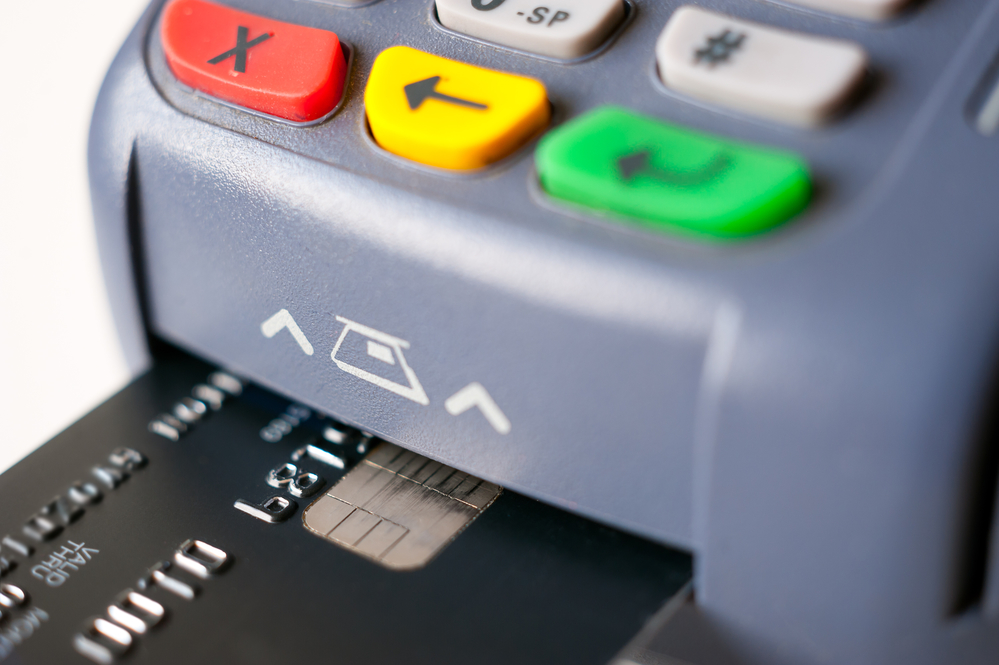Zero Fee Credit Card Processing
If you have not yet heard about zero fee credit card processing, you may be in for a surprise. About 40 states now allow the merchant or business to pass the credit card processing fee onto the customer, as long as certain guidelines are followed. This means the customer pays a small credit card processing fee that is added onto their bill, rather than the business paying a large bill each month. The mandatory guidelines have been established by the major card brands and fall into two categories. First, proper notices and disclosures must be given to the customer. Second, an itemized receipt must show how much the customer has paid as a “credit card fee” and that amount cannot be more than 4%.

What’s the Cost? Does the Business Owner Pay any Monthly Fees?
Although the customer and not the business owner is paying the “credit card processing fee” there are some fixed monthly costs of under $100 and the business does still have to pay for the processing of debit cards, but those fees have traditionally always been lower than the processing fees of credit cards. The fixed monthly costs are for such items as terminal use and automatic software updates, PCI compliance, account maintenance fee and next day funding fee.
How Much Can a Business Save?
Simply put, many businesses, even small businesses will be able to save thousands of dollars each year as explained in the two examples below. Larger business may be able to save thousands of dollars each month. So this is a retty huge savings and game changer for business owners that are looking for a way to cut costs and increase their profit margins without raising the cost of their products or services.
Example 1: Joe’s Pizza does about $30,000 per month in credit card payments and pays an effective processing rate of 2.5%, or $750 a month. If he switches to a zero fee credit card processing program his monthly fees will be less than $100, plus debit card processing fees. Depending on how much he receives by debit card each month, Joe’s Pizza could be saving over $600 per month, or $7,200 per year.
How Can I Do Zero Fee Credit Card Processing at My Business?

New Jersey businesses in the automotive sector can benefit significantly from this program. Businesses in the automotive sector include auto body shops, auto repair shops, automotive servicing stations, auto restoration and painting and even tow truck operators. Until recently, it was a bit cumbersome to integrate zero fee processing into a business, because it was not yet available for use in a standard credit card terminal.
Example 2: Bill’s Automotive does about $120,000 per month in credit card payments and pays an effective processing rate of 2.5%, or $3,000 a month. If he switches to a zero fee credit card processing program his monthly fees will be less than $100, plus debit card processing fees. Depending on how much he receives by debit card each month, Bills Automotive could be saving over $2,800 per month or $33,600 per year.
We advise business owners and merchants across the country on zero fee credit card processing, not just businesses in New Jersey. Our system is easily integrate into existing payment systems for either in-store or on-line payments. Until recently, it was a bit cumbersome to integrate zero fee processing into a business, because it was not yet available for use in a standard credit card terminal. There is only one terminal that has been certified and approved by the card brands for the use of zero fee credit card processing and we are one of the few that are able to offer this simple solution. We make sure the terminal is properly set up with the approved software, we provide the appropriate decals for the required notices to be given and we provide the necessary software updates to maintain that our clients are in complete compliance. We advise businesses on using the terminal (very simple) and set it up for them, saving even small businesses thousands of dollars, as the examples above show. Also, this program is approved in over 40 states and we are still waiting for zero fee credit card processing approval in Connecticut, Massachusetts, Texas, Oklahoma, Colorado and Maine.
While using the approved credit card terminal is the method that we suggest most our business clients to use, there is another option for businesses. For instance, businesses that are generally receiving large payments in a small volume each moth, like a law firm or auto body shop can use an on-line payments page which would require them to enter the credit card information on a secure web portal.
How Does a Merchant Explain Zero Fee Credit Card Processing to a Customer?
The easiest way to explain this to a customer is that due to rising costs, the business has decided to assess a processing fee to each customer that uses a credit card as a form of payment. Customers that pay by cash, check or debit card will not be assesses a fee. Some businesses see this as a way of reducing their costs instead of increasing their prices, which would affect all customers. Merchants see this as a fairer way to apportion costs and reduce their monthly credit card processing bill. Each customer paying by credit card pays a small surcharge so the business owner doesn’t have to pay thousands each year, or each month in some cases. It is similar to a convenience fee charged by governmental agencies and educational institutions according to state and federal law and pursuant to guidelines established by the major credit card brands.
What is the Distinction Between Surcharges and Convenience Fees?
The distinction between surcharges and convenience fees, although a fairly small distinction, is that a convenience fee is a fee levied for the privilege of paying for a product or service using an alternative payment channel, or a payment method that is not standard for the merchant. Many think it is just a matter of semantics and how you look at it, but it has been litigated quite thoroughly and is allowed in more than 40 states, with the prediction being the other states will soon follow.
Does California Allow Zero Fee Credit Card Processing
 Italian Colors Restaurant v. Harris California law allows surcharging, but certain requirements must be met. Italian Colors Restaurant v. Harris California law allows surcharging, but certain requirements must be met. |
YES. In the case of Italian Colors Restaurant v. Harris, a California U.S. District Court declared unconstitutional Section 1748.1 of the California Civil Code, which provides: “No retailer in any sales, service, or lease transaction with a consumer may impose a surcharge on a cardholder who elects to use a credit card in lieu of payment by cash, check, or similar means. A retailer may, however, offer discounts for the purpose of inducing payment by cash, check, or other means not involving the use of a credit card, provided that the discount is offered to all prospective buyers.” | |
The U.S. District Court ruled in March of 2015 that the California statute was unconstitutional since it violates the First Amendment by unreasonably restricting the way in which businesses are allowed to discuss the price of their products. Moreover, the court determined the state's law is overly broad and vague and permanently enjoined its enforcement. While the case is currently on appeal, businesses in California have been taking advantage of this opportunity to save thousands of dollars. One business sector in particular, is the automotive industry which includes auto body shops, auto repair shops, auto servicing stations and auto painting shops.
Is Surcharging Allowed in New Jersey?
Yes, surcharging is allowed in New Jersey, but it is not yet allowed in Connecticut, Pennsylvania, Massachusetts, Maine, Oklahoma or Texas. Surcharging, known as zero fee credit card processing is also called “zero cost merchant processing”, “zero fee processing”, "no cost credit card processing" and even "free credit card processing". These terms all mean the same thing though, the customer is paying an amount that represents the credit card processing fee the business has traditionally paid. The amount each customer would pay of course, is based on the amount of the purchase. The major credit card brands require that the business not charge more than the cost of the credit card processing fees or 4%. The zero fee credit card processing program we have for our clients uses 3.5% as the surcharge fee which is added onto the cost of the customer’s purchase. So, on a $10.00 purchase the customer would be paying $10.00, plus $0.35 plus applicable taxes, if any.
Can Any Businesses Switch to Zero Fee Credit Card Processing?
If your business is located in the over 40 states that currently allow a zero-cost processing type of arrangement you can, as long as your business qualifies for an account and your business does not fall into what is considered a high-risk category. High-risk categories include adult entertainment, gambling and even businesses that only sell tobacco products. Even if your on-line business is located in one of the states that allows zero fee credit card processing solutions, but you ship products all over the United States, you can still take advantage of our program. Our business clients in the automotive sector like this program and we have clients in the food and beverage sector that like it as well. The decision on whether or not zero-cost processing is right for your business is only a question you can answer.
If I Try Zero Fee Credit Card Processing, Can I Cancel at Any Time?
Yes, you can cancel at any time if you sign up through us, but some other programs being offered that are not the same as ours my have a lock-up period, early termination fee or charge you customers more for the surcharge fee. We suggest you try our program for a month or two, before you cancel your existing processor. If at any timer you feel this program is not right for your business, feel free to cancel at any time and your only obligation will be to return the credit card terminal to us postage prepaid.
How Long Does It Take to Sign Up and Start Using Zero Fee Processing?
The application process is similar to the application process for any merchant processing company. The only real difference is that the major card brands require the merchant to file a thirty (30) day advance notice with them that the business is electing to use a zero cost credit card processing program. This notice is handled by us so there is no extra work the business needs to worry about. We make the process as simple as possible and will answer any questions a business may have and will remain as your contact and trusted adviser, which is part of the personal service we pride ourselves on and why we feel we have such long-standing clients, large and small.
How Much Extra Will My Customers Pay?
As explained above our program adds a 3.5% fee onto every bill of a customer that pays by credit card. Whether your customer has a $5.00 bill or a $1,000 bill the amount of 3.5% credit card fee is calculated and itemized separately on their receipt. Their receipt will show on three separate lines the amount of the customer’s purchase, the amount of the 3.5% credit card fee they are paying and the amount of any applicable taxes. Some of our clients cringe when a customer takes out a credit card to pay for a $5.00 item or a $1.50 bottle of water. They can’t wait until zero fee credit card processing is available in their states. They are tired of paying fees for credit card processing that amount to thousands of dollars each year and feel that passing that cost off to customers that pay by credit card is a fair and equitable way to apportion costs. If you think about it, if a business has to raise costs it affects all customers, but if a business uses a zero fee processing solution that only surcharges the customers using a credit card, it is a more equitable solution and apportions the costs more fairly than raising prices for all customers.
How Do I Make Proper Disclosure to My Customers?
As required by state law and the major card brands you must fully disclose he program. We provide you with a small sticker to place somewhere near the entrance to your business and one near you place of payment, like your counter where your credit card terminal is placed. The sticker simply states, “To cover the cost of credit card acceptance, we pass on a 3.5% credit card fee. This fee is not more than the cost of accepting these cards. There is no fee for debit cards.”
Are Customers Charged a Fee if they Use a Debit Card?
No, your customers will not be charged a fee if they use a debit card, but you will pay a small fee when they do, because we are not allowed to surcharge customers when they use a debit card. Also, the way this zero cost processing solution works, is that he software detects that it is a debit card being used and will put it through as a debit card without adding on the 3.5% surcharge fee. Another great feature business owners will be happy to hear is that the software puts it through as a debit transaction without the need for the customer to put in a PIN or personal identification number, so it won’t hold up your line, especially when someone forgets their PIN or punches in the wrong number.
To Surcharge or Not to Surcharge, That is a Question for the Merchant?
While zero fee credit card processing is not for every business, we feel it should be allowed in every state and left to the business owner to decide if they will use it in their store. Only time will tell, but giving the business owner a choice is at least a step in the right direction, especially since the government and educational sectors are already implementing the cost shifting structure.
Powered by NXGEN Payment Services, a Registered MSP/ISO of Elavon, Inc. Georgia.
